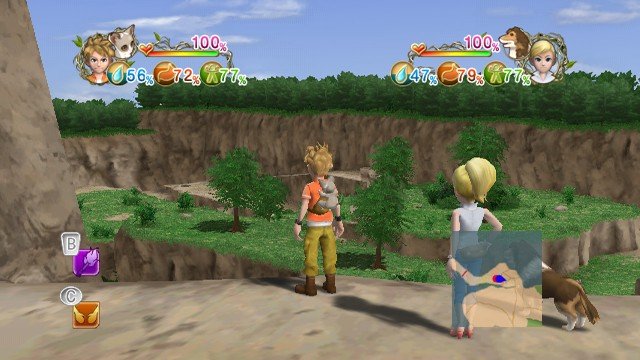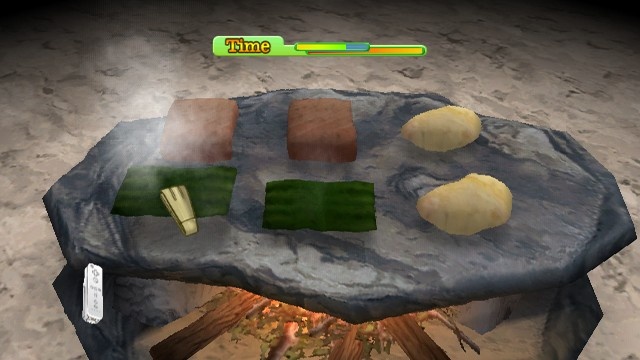From Daniel Defoe's 1719 novel Robinson Crusoe to the contemporary castaways of Lost, stories of island survival have long fired the human imagination. Throughout the course of three DS games, Konami's Lost in Blue series has tried to tap into this primal experience, but the adventurous elements have repeatedly been bogged down by tedious micromanagement. Now, Lost in Blue: Shipwrecked brings the series to the Wii, but rather than representing a fresh start, the larger scale of this iteration only serves to magnify the flaws that have plagued the earlier games.

You play as Aidan Sanders, a 16-year-old child of privilege who escapes a sinking cruise ship with his pet monkey Hobo and awakes to find himself on a tropical island. There, he must fend for himself, scavenging the island for food and supplies with which he can build the makeshift tools he needs to survive. It's not long before he's able to toss together a raft capable of taking him to another nearby island, where he meets up with Lucy, another survivor of the shipwreck. The two of them team up to explore the island and try to figure out how to get home. There are a few different directions the story can go in, depending on your actions, but in general, there isn't much attention paid to things like plot and character development. The focus here is on survival.
As you would expect, surviving on the islands is not easy. Unfortunately, it's also not much fun. Your characters have food, water, and stamina levels, which are in a constant state of rapid decline. You can rarely go for very long without resting, drinking, or eating, and you'll spend a great deal of your time just catching fish or hunting land animals to prepare your meals rather than exploring the island. And even considering the accelerated rate at which time passes, the amount of food the characters need to consume to sustain themselves seems outrageous. A meal made from four whole fish or from all the meat off a slaughtered wild boar might only fill Aidan or Lucy's stomach roughly halfway. It's fitting that concerns about food, water, and sleep play an important role in a game about life on an island, but Shipwrecked doesn't balance these concerns with the other aspects in an enjoyable way. The unending focus on micromanaging your characters' stats quickly grows tedious and drowns any enjoyment you might have found in the simple pleasures of island life. If you manage to survive and progress, you'll eventually be able to build creature comforts for your base camp, as well as more effective, durable tools that make your existence easier, but it's a long, dreary struggle just to get to that point. Even then, these concerns are never put aside for long.
Even when you are able to focus for a short while on island exploration, a number of frustrations hobble what should be an enjoyable endeavor. You'll constantly need to scale ledges as you make your way across the terrain, but with the camera positioned behind Aidan, it's often impossible to tell if you can make your way down until you walk up to an edge, at which point he'll either climb down or cry out in fear. There's a minimap that shows your immediate surroundings, but if you get lost (which isn't difficult), the map is useless for helping you find your way back to base camp. Although you need to take Lucy with you on your expeditions for practical reasons--you can carry twice as much stuff if she's with you and push rocks with her help that Aidan can't budge on his own--she needs a lot of help. For example, you'll have to help her up or down from nearly every ledge and across every jump, which really slows you down, making her seem like the embodiment of a helpless female stereotype. (Absurdly, she also wears high heels as she hikes across the island.) There should be an intrinsic pleasure to the experience of exploring--of finding out what lies beyond the next ridge--but these issues make it more of a chore.
The one bright spot here is the slew of minigames, all of which make good use of the Wii's motion controls and provide a much-needed diversion from the tedium of the game's other aspects. You'll use the remote with the Nunchuk to harpoon fish, saw wood, tie logs together, flip cooking meat, fan flames, row a raft, stay atop a stampeding bull, and much more. The games can be fun for a while because their number and variety is impressive. However, these, too, can grow dull through frequent repetition--fishing and cooking in particular you might find yourself doing a lot more than you would like. Some minigames can also be played cooperatively with a second player, which works fine, but considering that the bulk of the game is for one player only, it's doubtful that most players will get much use out of this option.
Visually, Lost in Blue is a total disappointment. The graphics look like something from five years ago, with flat textures, simple character models, and no details or flourishes to help bring the lush island environment to life. The sound is even worse. The music ranges from forgettable to irritatingly repetitive, and the occasional use of voice acting only serves to distract because you'll usually hear a character say only a portion of his or her printed text.

Your adventure can span across 101 days, each passing at the rate of an hour per minute, so even considering that you can sleep entire days away, Lost in Blue can certainly keep you occupied for quite a while. And once you're done, if you'd like, you can start all over as Lucy or play an unlockable mission-based mode centered on a pair of supporting characters, but neither of these options improve the game in any way. Surviving and making a life for yourself on a tropical island would be hard work, but playing a game about it shouldn't be quite so hard. And while the island has its share of secrets to be discovered, they're just not worth the effort. It's easier to eke out an existence on a tropical island than it is to squeeze much enjoyment out of this game.